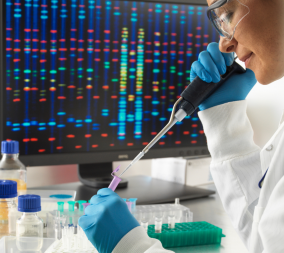For those of you who are currently pregnant or had a recent pregnancy, you may be somewhat familiar with the test called “Cell-Free DNA”. This is a noninvasive prenatal testing (NIPT) screening tool that is offered to our pregnant patients. Let’s examine the most important aspects of this test together.
What exactly is cell-free DNA (cfDNA)?
Someone way smarter than me figured out that when a woman is pregnant she can have small fragments of DNA in her bloodstream that come from the placenta. Sophisticated labs can test quantities of the different chromosomes in this cfDNA and provide information on certain genetic disorders. For example, the most common would be when an extra amount of chromosome 21 is found, called trisomy 21 or Down syndrome. This testing is usually used to screen for trisomy 13, 18, 21, and for missing or extra DNA in the X and Y gender chromosomes. (Because the test examines the sex chromosomes, it can tell you the gender of your baby if you want to know this information.) In addition, it can screen for rare DNA deletions. This test is run once the pregnancy is at least 10 weeks in size. In the near future more chromosomes will be available for analysis and testing gestational age will move a few weeks earlier.
Is this test accurate?
Use of cfDNA screening is certainly not perfect…it is, after all, a screening test and not a diagnostic test. Its ultimate goal, like other screening tests, is to let us know if you are higher risk or lower risk for some of the more common chromosomal abnormalities. It is the most accurate for Down syndrome and lesser so for Trisomy 13, 18, and sex chromosome abnormalities. Without getting too deep into medical statistics, it is important to know that the more likely a test is to be positive (based on a woman’s risk factors) the more accurate the test. Most of these genetic abnormalities that we test for occur more frequently in older women. For example, women over 40 years old have a baseline risk of Down syndrome of 1% or greater and women under 30 years old have a baseline risk of less than 0.1%. Thus, if a the woman over 40 gets an abnormal cfDNA test it is more likely to be a true positive, and if a younger woman gets a positive, then there is a better chance that the test is falsely positive and her baby is actually genetically normal. I’m sorry if that was confusing… put another way… the higher risk you are for these genetic abnormalities the more accurate the testing is.
What does it mean if the test returns negative (or normal)?
Negative genetics testing is always a very reassuring finding. As I mentioned before, this is a screening test and not a diagnostic one. However, a negative cfDNA test is usually about as good as it gets for the aforementioned abnormalities it looks at. Most of the tests I see with a negative result list the likelihood of the baby actually having the abnormality at less than 1 in 10,000.
What does it mean if the test returns positive (or abnormal)?
Once again, this is a screening test and not a diagnostic test. No decisions about the fate of the pregnancy should ever be made solely on the cfDNA testing. As mentioned above, there are chances that the results are false-positive and that the baby is actually genetically normal. When we get a positive result, we refer our patients to the maternal-fetal-medicine office to meet with a genetics counselor and/or the doctor. There, additional testing can be discussed.
What else should you know about the cfDNA test?
Sometimes patients get a call that the test results could not be obtained. This is most often due to the amount of cfDNA present in the blood being too low. If the pregnancy is too early or the patient is obese, this can, at times, lead to a need of repeating the test a couple of weeks later, or trying one of the other available screening options. Also important, while the test can be run in twins, it is less accurate when there was a twin pregnancy where one of the twins was lost earlier in the pregnancy (often referred to as a vanishing twin pregnancy). The accuracy in triplets and beyond is less well understood at this time.
What exactly is offered at Kamm McKenzie OBGYN?
As of today, 10/18/2023, we offer cfDNA testing to all of our patients, mostly using the company Myriad. The cost of the test is variable depending on whether you file it through your insurance or pay the company’s cash price. This money is collected by the company that runs the test, not by KMOBGYN. We are always looking to provide available tests that are the best value to our patients, so the testing we offer is subject to change.
I hope this was helpful! Thanks, as always, for taking the time to read my post.


















